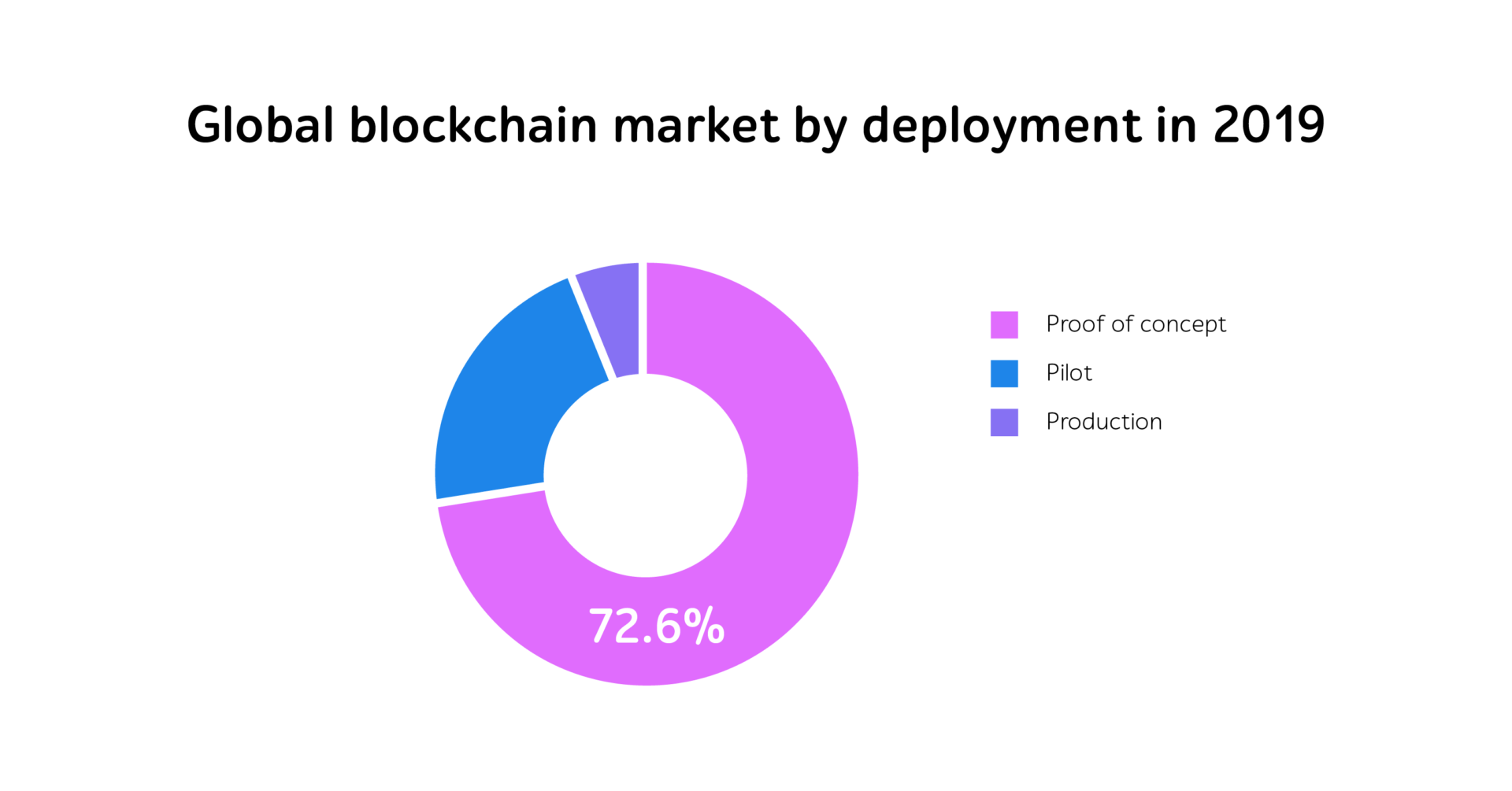
Winning trust: 5 industries that need blockchain testing
Winning the competition is gradually converting into winning trust, as software success in the market depends on the users’ opinion.
Within gratifying end-user requirements as a top priority of businesses, forward-thinking companies strive to astonish customers and provide reliable software. Recent lockdown events impacted re-imagining business strategies and paved the way for accelerating disruptive trends of shifting towards more digital practices of working, communicating, and interacting with customers.
Blockchain may be of help with that through building users’ trust and improving efficiency, and this is why organizations are applying it to a greater extent each year. Statista report showcases the overall spending on this technology is expected to increase by 4.3 times by 2024.
Blockchain testing is becoming a must-have amid companies that are actively using this innovation, as it helps deliver upscale IT products and get confident in their stable and proper operation.
To provide you with a one-stop overview of holistic blockchain testing, we’ve prepared a list of the top 5 industries where introducing this technology is gaining momentum and blockchain app testing may streamline winning trust in the market.
Top 5 industries having blockchain as a pivot in an IT strategy in 2021
1. BFSI
Accounting for 60% of the technology world market value, it is the most blockchain-oriented sector dealing with valuable resources.
Transforming the classic investment and asset management operations and enhancing their transparency and security, blockchain is protecting financial institutions from malicious activity, fraud, and money laundering. Now, it is possible to quickly identify changes in behavioral patterns, trace reported illicit funds, and get deeper insights into valuating risks of all parties.
2. Retail
Retail is also processing a myriad of transactions. Besides, the evolution of these innovative systems paved the way for other activities, such as tracking the flow of goods or verifying payments through a supply chain.
Blockchain technology allows sellers to contact buyers directly without middle parties’ assistance streamlining the products journey and providing a clear overview of its pathway.
3. Real estate
Dealing with en masse paperwork, the future of real estate is about smart contracts helping eliminate commission rates and enable funding release when conditions satisfy both parties. Owing to expanding blockchain possibilities, it allows storing all the documents and transactions in an online space devoting minimum efforts and money.
4. Healthcare
Switching to the online storage of medical documents, this life-threatening industry is highly susceptible to cyber attacks. 93% of clinics have experienced a data breach over the past three years, and 57% of them have had 5+ cyber incidents during the same timeframe.
Considering growing caution in ensuring the safety of personal patients’ data and their trust to healthcare institutions, blockchain may be of help with that. Providing origin of drugs, medical products as well as transparency around health-oriented supplies and therapies, it can help build confidence and propel the industry towards.
5. Government
By encompassing multiple operations related to financial transactions, registry, processing documents, and applying an old-fashioned approach to their handling, governmental software often operates slowly and is prone to instability.
Implementing blockchain-based solutions may revolutionize legal processes and help eliminate bureaucracy issues. Thus, governmental organizations may build trust with people using smart contracts, intellectual property rights, land registry, and many more.
Blockchain testing: helping get more value
Usually, blockchain initiatives start with proof-of-concept projects that prove value on a small scale. In 2019, the PoC segment held 72.6% of the market share. However, the troubles emerge when moving to production due to a lack of observability.

So, how to get confident in proper work of blockchain systems? Yes, one of the ways is to apply a comprehensive blockchain testing package helping detect critical defects and ensure smooth going live. a1qa’s experts have gathered 5 QA tips for that.
Tip 1. Functional testing
To be confident in system appropriate operation, one should supplement introducing blockchain app with checking functionality. Testing business logic and covering possible users’ scenarios may contribute to accurately processing blockchain components and transparent and secure activities. Being a cornerstone of software testing, all the industries should consider its execution.
Tip 2. Performance testing
Embracing thousands of transactions worldwide every day, blockchain has the potential to add $1.76 trillion to the global economy by 2030. Considering this drastic increase in the volume of sensitive data processing, companies should perform thorough testing before releasing IT products.
Executing performance verifications may ensure resilient work of the system under heavy load and consistent quality of the software product. It is especially topical for industries handling massive information blocks like BFSI, healthcare, and government.
Tip 3. Integration testing
Connecting blockchain systems to various platforms, companies need to check their solid joint work. Integration checks may be an escape solution. QA experts verify the cohesiveness and operability of intersystem connections across all blockchain app environments and integrated components. So, they can identify critical points and ensure stable interoperability.
Interacting between multiple systems and devices, retail and BFSI are particularly in need of such checks.
Tip 4. Smart contract testing
Real estate and government industries are only planning to introduce blockchain. Dealing with a great number of documents, they are moving to online data storage and processing solutions. To provide apps stable functioning and users’ confidence, companies should consider timely diagnosing these platforms before going live.
Within business logic verification as well as testing digital signature and messaging features, QA engineers rectify software glitches sharply and ensure strict blockchain apps compliance with the pre-defined software requirements.
Tip 5. Security testing
Have you noticed that information is quite a valuable asset requiring thorough protection? Possessing sensitive data, BFSI, government, and healthcare should pay great attention to safeguarding it properly.
But how can companies accelerate obtaining reliable and highly secure ecosystems within market fast pace? The answer is — through security checks. In this very case, QA helps ensure that keys storage and encrypting system effectively ward off potential security attacks.
For that, accounting for multi-layered safety structure in blockchain, QA specialists supervise that one security layer doesn’t affect the other.
These are principal testing types applied to blockchain apps. Of course, companies may harness a range of others depending on the business objectives. What’s more, test automation is also relevant in checking such platforms. It can optimize QA process and speed up time to market that is extremely crucial within fast-paced market evolvement.
Bottom line
Winning trust is becoming a prime factor of business success. To keep up with that and sustain leading positions, companies across different industries should update their IT strategies with technological trends and innovations.
Blockchain is one of the go-to ways to achieve customers’ confidence and provide them with efficient and safe virtual space for processing financial transactions, buying goods, getting medical assistance, concluding contracts, and performing legal operations.
Definitely, blockchain can have the greatest impact on BFSI, retail, real estate, healthcare, and government industries in 2021. So, all-inclusive blockchain app testing can become an indispensable measure to build trust with the target audience and accelerate the achievement of planned business objectives.
If you need professional QA assistance in ensuring the proper work of a blockchain solution, feel free to write to a1qa’s experts.








